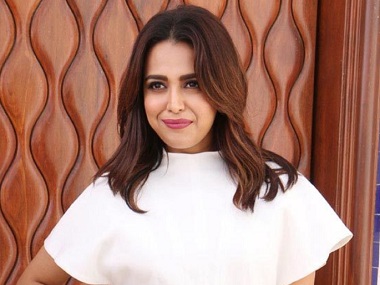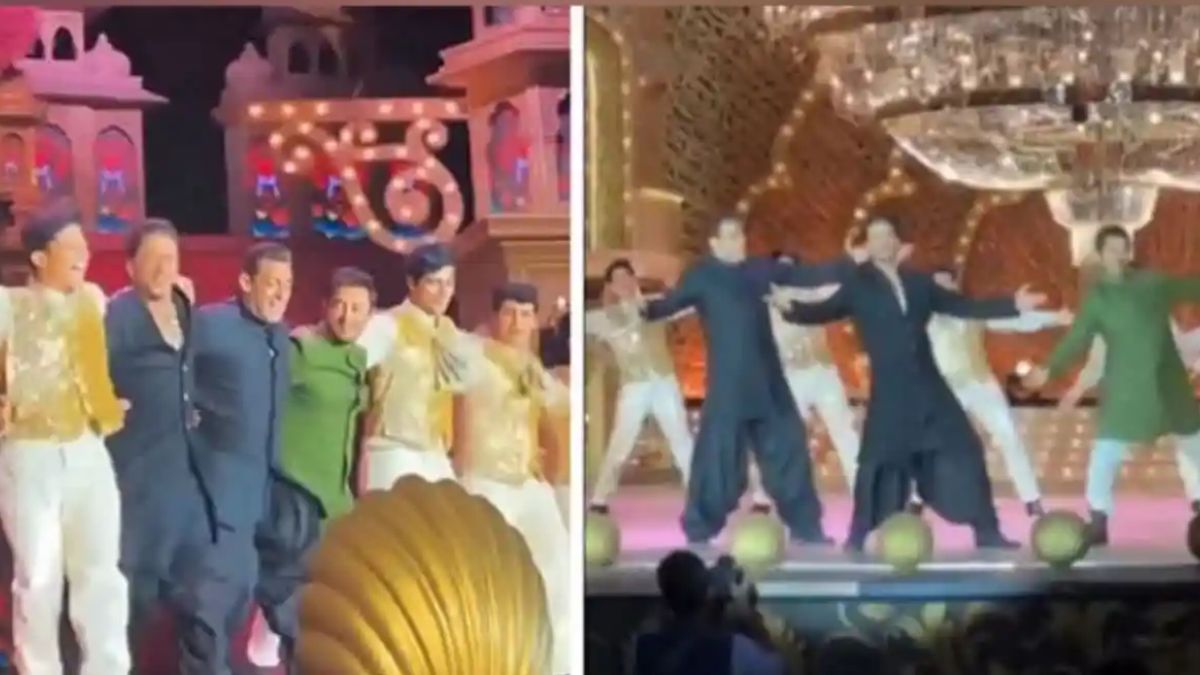Swara Bhasker was one of the first persons to support Tanushree Dutta when the latter accused Nana Patekar of sexually harassing her on the sets of Horn Ok Pleassss 10 years ago. Swara followed Shruti Seth in tweeting her support for Tanushree, and was followed by fellow actors like Farhan Akhtar, Richa Chadha, Priyanka Chopra, Twinkle Khanna, Anurag Kashyap and Sonam Kapoor among a few others.
Amid speculation over whether or not this will snowball into Bollywood’s own #MeToo movement, Swara makes it clear that the chances are slim, even though she is optimistic about arriving there very soon.
In an interview with Firstpost, Swara analyses why Bollywood alone should not be held at gunpoint to initiate a movement against sexual harassment, and the hurdles that come in the way of a Hollywood-like awakening for the Indian film industry. Excerpts from the conversation:
On how Bollywood’s structure differs from Hollywood’s
We have to taken into account that Bollywood has evolved from a (largely) family owned system where producers put their own money and mortgaged their houses to make movies. For an industry that is a hundred plus years old it was comparatively recently that it became qualified to get bank finances to make films. So even today while the economic structures have changed drastically and corporates have come onboard, and there is a barrage of outsiders who now work in every area of this industry- it still remains a pretty small, intimate, relationship based industry. Largely speaking the people in power, the A listers are all people who’ve known each other for long, often times they’ve been acquainted since childhood, their families have known one another over years over working with each other in multiple films and everyone is a pretty close social acquaintance. In some sense everyone is compromised by these close relationships and friendships because when a crisis breaks- like (inevitably) an outsider accusing an industry veteran of sexual harassment at the workplace- one’s family relations or friendship perhaps make it difficult to speak out and openly condemn the act. Worse, imagine if someone who is from the industry, may someday be harassed by someone she has grown up with. The families may know each other. In such a hypothetical case too, it is not very easy to speak out.
Moreover actors in Hollywood are better protected. They receive lifelong royalties for their work, and their unions are active in protecting the interests of the members. Young actors and actresses are a lot more vulnerable in Bollywood. Our systems are a lot more fluid, we are easily replaceable despite so-called contracts. In general, if you are a new / young actor or a non-star actor, your contracts are completely one sided and favour the interests of the producers almost entirely. This leaves actors in a fairly tenuous position actually. Shoots cost money on a per day basis. Raising the issue of sexual harassment at the workplace, protesting an incident and standing up for your rights (legitimately so) cost the producer money. It is just so much more convenient to silence the victim by convincing or coercion and carry on with the days work. Or replace her if she proves to be too noisy, As we saw evidently in the case of Tanushree Dutta in 2008. This is the truth - not just in Bollywood- but everywhere in India about women who report sexual harassment at the workplace. In most cases they end up finding themselves thrown out of the workplace and out of work!
I’m not justifying Bollywood’s silence on the issue of sexual harassment at the workplace, I’m simply saying, these easy breezy comparisons to #MeToo in Hollywood may make people feel more righteous but they fail to recognise the particular power structures that operate in Bollywood and the complexity of these structures and relationships. And for any meaningful change to come to Bollywood, we must begin by recognising these structures, the particular vulnerabilities of the actors / any other person who is victimised by sexual harassment and the reasons why speaking out is so hard in Bollywood; instead of just asking Bollywood to blindly copy paste Hollywood’s #MeToo.
On if there is a whisper network in Bollywood
I don’t know if there exists an organised whisper network in the industry. We actresses obviously talk about such incidents with each other, especially if the other actress is a friend. We also hear on set gossip from say the makeup artists or hairstylists or via spot boys about how a certain actor or producer is sleazy or how someone has a bad reputation or about incidents that may have happened on set. A lot of it may be genuine but there is also a lot of random malicious, baseless gossip floating around. So one is not really always sure whether a particular thing is gossip or if it actually happened. As I said if there is an organised whisper network in Bollywood, I have no idea about it.
On actresses not always being aware if they were sexually harassed
I think the biggest problem is that there is just SO MUCH information paucity around the issue of sexual harassment at the workplace. I think the shooting sets (which are typically unregulated workspaces) feel so dynamic and fun that they sometimes feel more like a picnic and less like an office. For many years, I did not know that the things that happened to me counted as harassment. Six months ago I realised that those incidents and conversations that I would smile through or flirt my way out of count as sexual harassment at the workplace. It was not violent so I did not recognise it as harassment. And that is not just the case with Bollywood but a lot of other workplaces too. I’m sure 90 percent of the times, women do not even realise when we are being harassed at a workplace. We just see it as “Oh the boss being an a**hole.” This is the first step. We all – men and women – need to inform and train ourselves to recognise sexual harassment at the workplace; both to call it out and to check for it in our own behaviour.
On Indian media and civil society making the ecosystem more conducive
The media’s favourite pastime these days is too ask “When will Bollywood have a #MeToo?” Let us recall that ‘Me Too’ is a phrase activist Tarana Burke began to use in 2006. It took Hollywood 11 years to hear ‘Me Too’ and act on it. And that was because their society at large, and media had woken up to women’s voices and stories in the context of the Women’s March against a newly elected President who was facing multiple accusations and charges of sexual assault and harassment.
In 2017 Tarana Burke’s ‘Me Too’ became #MeToo in Hollywood because American civil society and media were ready to hear voices that they had successfully ignored all this while. I feel until Indian civil society is not ready to listen, it is not fair to expect actresses to enter into this vicious atmosphere of denial and accusation, and relive their personal traumas in the media glare, only to be called publicity whores. I mean we are a society that refuses to accept that in Kathua the gang-rape of an eight-year-old child even occurred! Despite the fact that the courts have recognised it and a chargesheet has been filed, people are still denying Kathua. Tanushree Dutta spoke about the same incident 10 years ago as well. Why did the media not take it up then? We didn’t hear Tanushree’s voice because we didn’t want to. We as a society were not ready to hear that story. Post the 2012 Delhi gang-rape, the public discourse in India on gender violence has shifted, it is more evolved and victim friendly now. The media is more sensitive to these stories now. There is the social media explosion which allows for the phenomena of citizen reporters and gives a platform to voices previously unheard. And that’s why in 2018, post-Nirbhaya [sic> in this age of social media, Tanushree’s story told for the second time caught the hashtags and our attention.
But I do think that until there is more responsible writing, fact-checking, research, and until they stop putting salacious headlines to these stories, we won’t reach where we want to. In America, the Me Too movement was (propelled by) thorough, responsible investigative journalism of the best kind.
On how the law needs to go hand in hand with society
I’m sorry to be disappointing anyone on this, but I feel Bollywood actresses have to do this together at a time that they feel is right; when they feel like sharing their stories, individually or collectively. A lot of things that happen with us do not hold in the court of law because often, there is no way to prove what happened; or in Tanushree’s case, witnesses are actively hostile and complicit. We don’t even have Vishakha judgement compliances in most cases on sets and shoot locations.. Until we don’t get enough producers on board and have a situation where there are active mechanisms at work, it is all going to be one scandal after another. I’m sure this is a discussion many people in the industry are having. I’m sure something will change, but that change has to be structural, it has to be supported by regulations and enforcement from the union and the guilds. And most importantly that demand for change, for a safe workplace for one and all has to be a collective demand. The Malayalam film industry is a great example where the Women’s Cinema Collective is actively addressing sexual harassment claims. It took a gruesome crime against an actress by a colleague, a superstar of Malayalam cinema, to bring these women from the Malyalam industry together. In that sense, it was a Nirbhaya-like event for them. But it has not been easy for them either. They are facing threats from fan groups and silent boycotts from work and hiring. Just very recently, accused Dileep was reinstated to AMMA, the apex union for Malayalam film actors, which prompted three actresses to resign. So there the struggle is still on. We in Bollywood can really take inspiration from them.
On how women need to lead the movement and not expect the same only of men
I’m really glad that Farhan (and then Anurag ) tweeted in support of Tanushree. But honestly, I do not expect too many of the men to speak up. Change in status quo – anywhere in the world – comes when the oppressed decide to fight for their rights. Not because the privileged one day in a good mood decided to do some justice in the world. Nobody ever got justice or rights on a platter. It look years of protest by the Black South Africans for apartheid to be abolished in South Africa. Similarly, the practice of untouchability was criminalised in India not because the upper castes out of the goodness of their hearts decided to do right by the Dalits… But because the Dalits began to organise and fight for their own rights. So while the commitment to making Bollywood a safe workplace has to be a collective effort, the demand for safety and justice will likely come from those most vulnerable to sexual harassment at the workplace and that section is overwhelmingly the female population working in Bollywood as actresses, strugglers, dancers, extras, ADs, art department, costume team, makeup department and of course the technicians.
I hear the footsteps already. Thank you Tanushree Dutta and thank you also Janice Sequeira and Shyni Shetty .
)
)
)
)
)